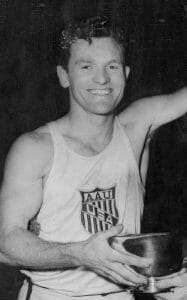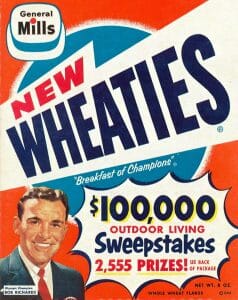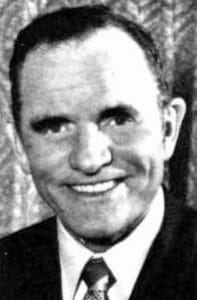
Born in Illinois, Richards excelled at athletics, including basketball and quarterback for his high school football team. But his true passion, beginning in junior high, was pole vaulting, which he practiced in his backyard. Richards is the only male two-time Olympic gold medal winner in the pole vault (1952 and 1956, after winning a bronze in 1948), and also ran the decathlon at the 1956 Olympics. Richards has another notable first: he was the first athlete to appear on the front of Wheaties cereal boxes, in 1958, when he became a spokesman for the brand. That continued with various iterations through 1970, when he moved on. He was elected to the U.S. National Track and Field Hall of Fame in 1975, and the U.S. Olympic Hall of Fame in 1983. He cleared 15 feet more than 125 times — using an aluminum pole, not the bendy fiberglass poles current vaulters use to clear 20 feet plus. His son held the U.S. high school record of 18 feet 2 inches for 14 years. “If you want to get a clear picture,” Richards cracked, “give today’s vaulters a stiff pole.”

In 1946, Richards was ordained as a minister by the Anabaptist Church of the Brethren (and was known as the “Vaulting Vicar”). One day, he asked a 13-year-old girl who attended his church, “What are you going to do with your life?” Her answer: “Reverend, I’m going to be the best tennis player in the world.” Her name: Billie Jean King. At the 1952 Olympics, when he defeated Viktor Knyazev of the Soviet Union, Knyazev hugged him. He returned the competitor’s hug — and was criticized by some American officials and newsmen. “These people who want to wave the flag and play the band, that’s not the real spirit of the Olympics,” he said in an interview years later. “One day, we’ll get out of all this flag-waving and nationalism. That’s not what the Olympic spirit is all about.”
Richards had a great gift of oration: he leveraged his fame into a wildly successful career as a motivational speaker, giving more than 25,000 talks over a period of several years. “I reckon that there were over a million guys in America who could have beaten me in both Olympic Games,” he said in one that was recorded and sold under title, There’s Genius in the Average Man (embedded below). “But they didn’t believe they could win the Olympics. They had never gotten on a track. They had never tried. Your capacity is only discovered, ladies and gentlemen, in challenge. And the bigger your challenge, the bigger you become as a person. If you’ve got a little tiny goal, a little tiny challenge, you’ll never make it.”
“I’m the greatest!” he quoted Cassius Clay, who later took the name Muhammad Ali. “You know how important it is to feel that way about yourself? To feel that you’ve got it? Most of us say, ‘I’m the worst. I can’t do anything. I’m terrible.’ We wonder why we don’t do anything when we don’t believe we can. Can you imagine going into a boxing ring thinking, ‘Maybe I’m not the greatest’?”

Richards later took on the biggest challenge in American public life: in 1984, he ran for president! Claiming the U.S. “must work to get rid of these tyrants who rule us,” he chose the Populist Party, which formed in 1984. But one of its co-founders, Willis Carto, primarily became known for his promotion of antisemitic conspiracy theories and Holocaust denial, and was embraced by extremist organizations. Richards came to regret being on that ticket “given the extremism that developed in the party,” said his daughter, Tammy Richards LeSure. Richards retired to a ranch in Texas, aptly named The Cross Bar, and in 2012 fully retired to Waco. Robert Eugene Richards died at his home in Waco on February 26 — three days after he turned 97.
– – –
Small World Note: Last week, before Richards died, I was reading a few-years-old book that mentioned the career of tennis star Billie Jean King, and how she got her start — I noted at the time that it was her minister who challenged her to think about what she was going to do with her life. I’m sure he was named, but didn’t remember. It was while I was researching and writing this Honorary Unsubscribe that I came across the mention that he had asked the teen-aged Billie Jean King, who went to his church, what she was going to do with her life. The timing is wild.
Each of the following videos is 28 minutes.
